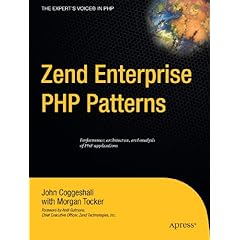For many years I felt the best overall MySQL book was The MySQL 5.0 Study Guide. It is still a very good book but it does not cover third party tools and is getting slightly dated. My new favorite MySQL book is MySQL Administrators Bible
 . It covers everything from installing and monitoring MySQL servers to tuning and scaling. This book is written in a clear, easy to read style and deserves to be on the bookshelf of any MySQL DBA. This will be one of those books that you will dog-ear pages and festoon with PostIt notes.
. It covers everything from installing and monitoring MySQL servers to tuning and scaling. This book is written in a clear, easy to read style and deserves to be on the bookshelf of any MySQL DBA. This will be one of those books that you will dog-ear pages and festoon with PostIt notes. The next book is for those of you wanting to expand your PHP knowledge
 . I have been using PHP back when it was called Personal Home Page (and using it with a free database from tcx.se called MySQL) and have a habit of skimming every PHP book I see in bookstores (and databases, Linux, and a few others; My family knows this and avoid my book store trips). Particularly interesting for those in the MySQL world is the information under Workload-driven Performance Tuning. I started skimming this book and realized that there was a lot of good information inside the covers that made it worthy of purchase.
. I have been using PHP back when it was called Personal Home Page (and using it with a free database from tcx.se called MySQL) and have a habit of skimming every PHP book I see in bookstores (and databases, Linux, and a few others; My family knows this and avoid my book store trips). Particularly interesting for those in the MySQL world is the information under Workload-driven Performance Tuning. I started skimming this book and realized that there was a lot of good information inside the covers that made it worthy of purchase.Please note that I get no kickbacks from Amazon and use their links as anyone in the world seem to have ubiquitous access to Amazon. And that I have met half the authors pairs for each book. I worked with Morgan Tocker and have met Sheeri Cabral at the last few Users Conferences. Nothing against John Coggeshall or Keith Murphy!
And lastly I recommend Fool
 for light riding. It is a re-telling of King Lear as written by the court fool. There is nothing in this book that will make your code run better or your server return data more efficiently but it a very funny read.
for light riding. It is a re-telling of King Lear as written by the court fool. There is nothing in this book that will make your code run better or your server return data more efficiently but it a very funny read.
